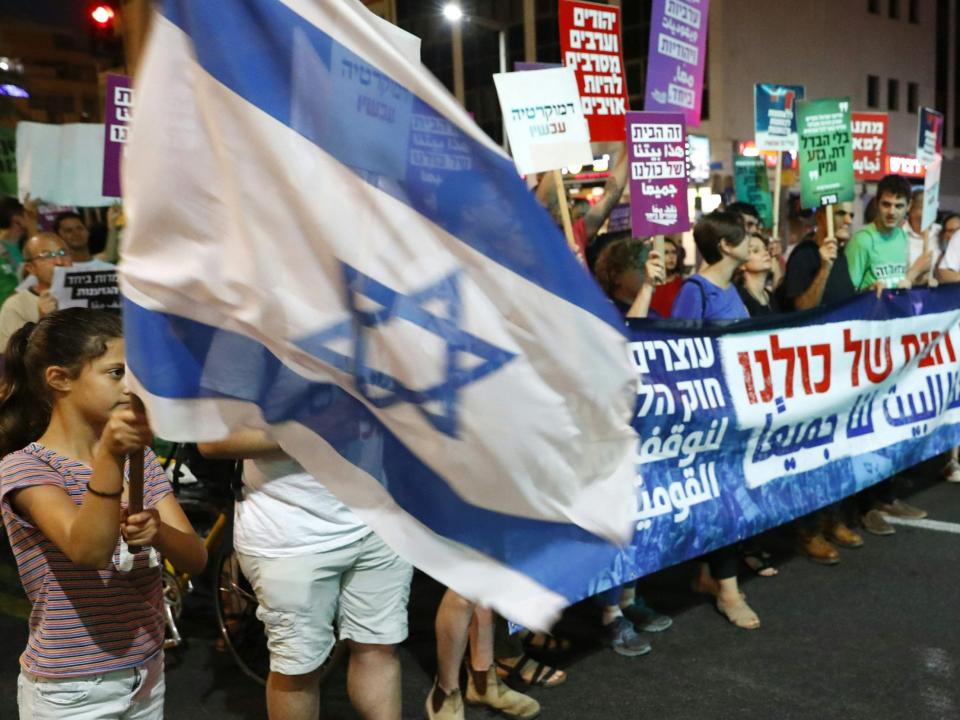Israel law which could create Jewish-only communities protested by thousands over ‘apartheid’ fears

Israel’s ruling party is seeking to pass a contentious law this week that could remove Arabic as a national language and allow Jewish-only communities, sparking uproar from critics that say it excludes the country’s Arab minority.
The so-called "nation state" law, which is backed by Likud, the party of Prime Minister Benjamin Netanyahu, has sparked bitter divides within Israel’s parliament and fierce backlash abroad.
The government says the bill, which holds constitution-like status, merely enshrines into law the country’s existing characteristics. But sections, including downgrading the Arabic language and promoting segregated communities, have drawn comparisons to South African apartheid and anti-Semitism in 1940's America.
Thousands of Israelis took to the streets in Tel Aviv on Saturday, demanding the proposal be scrapped as they said it encouraged separation, was undemocratic and excluded Israel's Arab minority, who make up 20 per cent of the population.
Even Israel’s President Reuven Rivlin, who rarely comments on politics, weighed in, warning that elements of the draft law would “harm Jewish people, Jews throughout the world and the State of Israel."
It could “be used as a weapon by our enemies” the Israeli president told a special committee last week.
Avichai Mandelblit, Israel’s attorney general, has also expressed reservations about it.
But Mr Netanyahu is hoping it will be pushed through before Israel’s parliament session ends on Sunday.
Defending the proposal, Mr Netanyahu said this last week: "In the Israeli democracy, we will continue to protect the rights of both the individual and the group, this is guaranteed. But the majority have rights too, and the majority rules."
In the Israeli democracy, we will continue to protect the rights of both the individual and the group, this is guaranteed. But the majority have rights too, and the majority rules
Benjamin Netanyahu, Israeli prime minister
If passed it would become one of Israel’s so-called Basic Laws, which underpin Israel’s legal system and so are harder to repeal.
The final wording of the draft law is still being fought over but in the current version the main sticking point is making Hebrew the only national language, by changing Arabic from an official language to one of “special status”.
Two other articles have also fuelled bitter divides.
One section, which stated that Jewish law could be implemented in certain cases, was eventually removed. The other, which allows separate communities "on the basis of religion and nationality”, saw furious debates in Israel’s parliament as critics said it backs the establishment of closed Jewish communities.
Mr Netanyahu and Naftali Bennett, head of the nationalist Jewish Home party that has been pushing an even stronger version of the law, reached a compromise agreement late Sunday to alter the wording. In the new draft it includes a vaguer reference, considering the promotion of Jewish settlements as a "national value”.
But opposition members of the Israeli parliament said the change is still damaging.
Dov Khenin, a parliamentarian on the Joint List alliance of Arab-led parties, indicated that the new wording was even worse than the original which at least “pretended to be neutral”.
“It’s stating explicitly that only Jewish communities will get priority. This is a model of undisguised racism, suited only to corrupt rulers who have lost all shame,” he was quoted as saying by Haaretz, a left-leaning paper.
Tamar Zandberg, of the left-wing Meretz party, said despite the alteration the bill was still “a basic law of racism” and compared it to apartheid.
"The Nation-State Law was taken out of storage and apartheid pops out of the box,” she said.
Ahmad Tibi, an Arab lawmaker also on the Joint List, called the bill “dangerous”.
He said: "It is threatening what remains of a so-called democracy. It is targeting the Arab minority in Israel.”
The law has also sparked criticism from within the powerful pro-Israel lobby abroad.
Jerry Silverman, president and CEO of the Jewish Federations of North America, flew to Israel last week to discuss revisions to the bill. He said even though some of the more problematic language had been removed, just reading the original bill has damaged Israel’s reputation abroad.
“When we are trying to truly support Israel, fight the [boycott and sanctions movement] and... educate young adults and connect them to Israel, these things are barriers and really create challenges for us,” he told The Jerusalem Post.
Since its creation in 1948, Israel has seen itself as a Jewish and democratic state and has maintained its Arab population is protected by the legal code. This legislation looks to legislate that core identity. In reality many segments of society in Israel are bitterly segregated and Arab Israelis have long complained of inequality.
The law has different articles defining Israel – one says that Jerusalem is Israel’s capital – another lays out the Israeli flag (with the Star of David) and another says the Hebrew calendar is the official one.

 Yahoo News
Yahoo News 